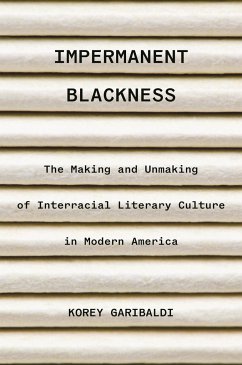Revisiting an almost-forgotten American interracial literary culture that advanced racial pluralism in the decades before the 1960sIn Impermanent Blackness, Korey Garibaldi explores interracial collaborations in American commercial publishing-authors, agents, and publishers who forged partnerships across racial lines-from the 1910s to the 1960s. Garibaldi shows how aspiring and established Black authors and editors worked closely with white interlocutors to achieve publishing success, often challenging stereotypes and advancing racial pluralism in the process. Impermanent Blackness explores the complex nature of this almost-forgotten period of interracial publishing by examining key developments, including the mainstream success of African American authors in the 1930s and 1940s, the emergence of multiracial children's literature, postwar tensions between supporters of racial cosmopolitanism and of "Negro literature," and the impact of the Civil Rights and Black Power movements on the legacy of interracial literary culture. By the end of the 1960s, some literary figures once celebrated for pushing the boundaries of what Black writing could be, including the anthologist W. S. Braithwaite, the bestselling novelist Frank Yerby, the memoirist Juanita Harrison, and others, were forgotten or criticized as too white. And yet, Garibaldi argues, these figures-at once dreamers and pragmatists-have much to teach us about building an inclusive society. Revisiting their work from a contemporary perspective, Garibaldi breaks new ground in the cultural history of race in the United States.
Hinweis: Dieser Artikel kann nur an eine deutsche Lieferadresse ausgeliefert werden.
Hinweis: Dieser Artikel kann nur an eine deutsche Lieferadresse ausgeliefert werden.








